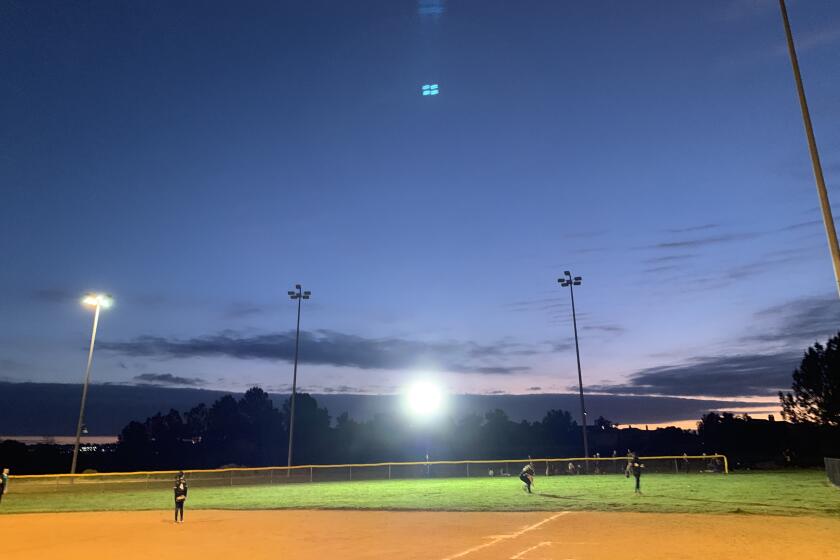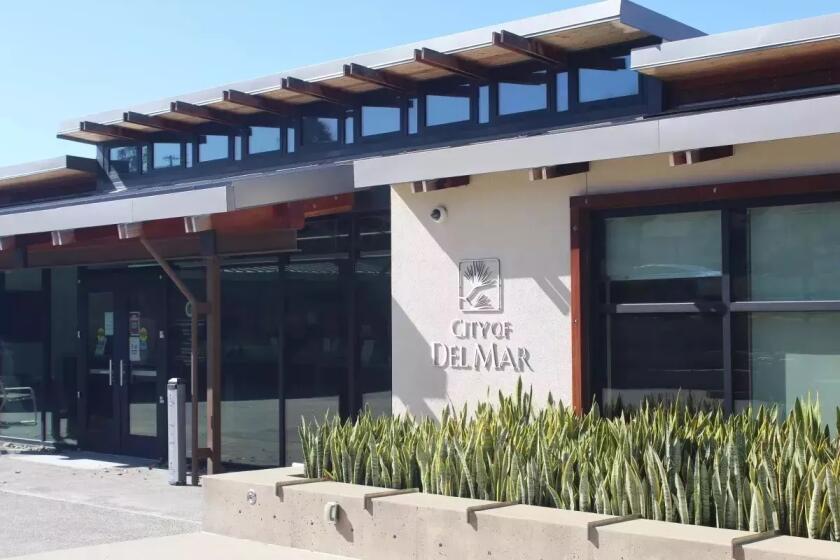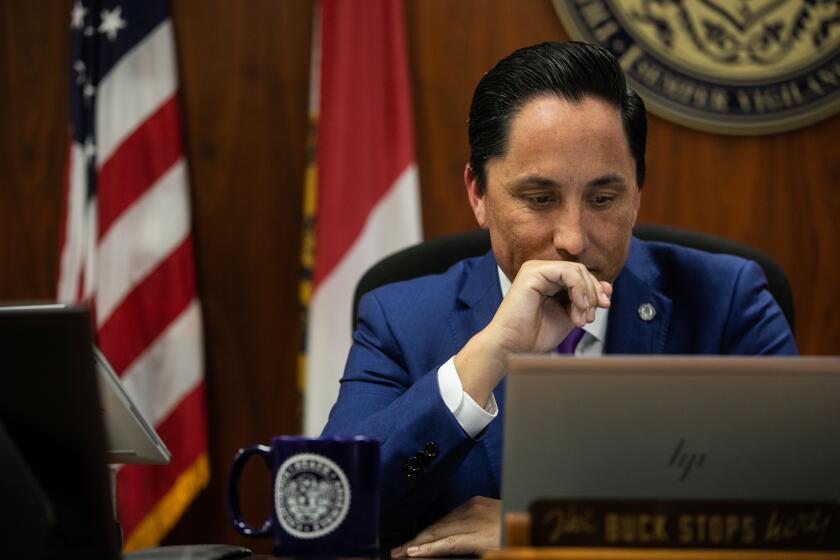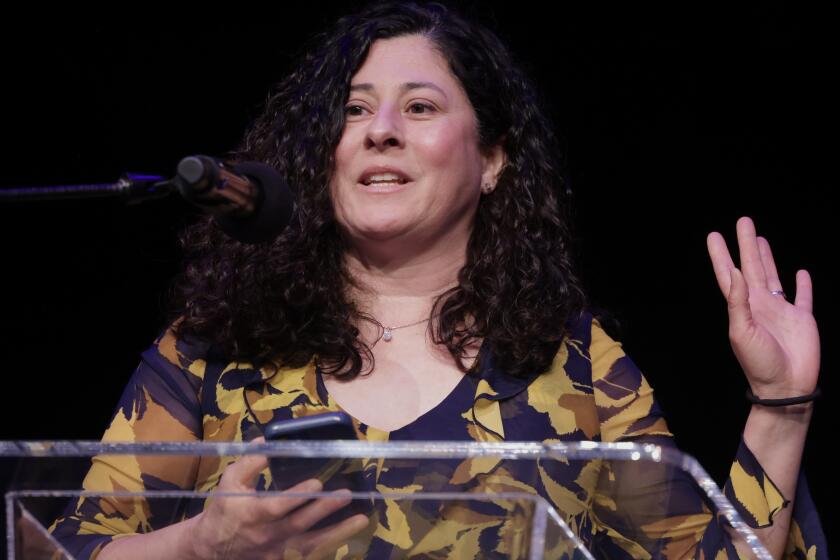San Dieguito finds short-term solution for ATP portables
Facing criticism from parents over the decision to house students in the Adult Transition Program (ATP) in two portable classrooms on the new Earl Warren Middle School campus, the San Dieguito Union High School District (SDUHSD) invited parents to to tour the facility and participate in a special meeting July 28 on the campus.
For over two hours, SDUHSD Superintendent Eric Dill listened and responded to a group of frustrated parents. Some parents wanted an apology from the district and others did not, instead wanting answers to their questions and an assurance from the district that their children were a priority and that their concerns were truly being heard.
“I know that some promises were made for involvement on the planning of that classroom and we didn’t deliver on that promise and I think that’s led to a lot of the concerns,” Dill said. “There were promises of more involvement and we didn’t do that and I’m sorry for that.”
On July 28, parents learned that what was meant to be a permanent home for ATP will now be a transitional one. In the short term to deal with capacity issues, a part of the ATP program will be housed in a classroom at La Costa Canyon High School (LCC) this fall with the intent of the full program moving there for the 2018-19 school year. According to Dill, long-term plans would include the construction of a permanent home for ATP, possibly at the Sunset High School campus in Encinitas or bringing the program to a community college such as Mira Costa.
ATP is a stand-alone, specialized, four-year program for special education students ages 18-22. For the last couple of years, the district housed ATP students in portables at Earl Warren. Prior to that, the students were moved almost every year to different locations, such as the local library.
For some ATP parents it was the first time seeing the rooms last week — some said they weren’t as bad as they thought although many remarked that there was not enough windows and natural light, and some questioned whether the rooms had enough space to accommodate students in wheelchairs. Others, who had seen the portables before, said there had been improvements since the last time they saw them, both inside and outside with the landscaping. The air conditioning was working and the rooms were cool and did not appear to smell badly as some parents alleged at the last board meeting. Dill said the modulars, and the technology the portables are outfitted with, are similar to the 160 portables used throughout the district for general education.
“The classrooms wouldn’t be that bad if not for the juxtaposition of the brand new state-of-the-art school buildings just 10 feet away,” one parent said, noting the real issue is the perception that ATP students are “second-class citizens” and that their facilities are “separate and unequal.”
In July, the board split 2-2 on spending $33,000 to improve the conditions of the existing portables by adding two windows and two doors with windows. Dill did not respond to a request for comment about whether the board could reconsider adding them at a future board meeting.
“We heard the concerns about the lighting,” Dill added, noting that they have ordered LED lighting to replace the fluorescent lights in the portables.
The four-year program currently has three teachers, 20 students and 10 aides. Next year there could be as many as 47 students — along with the needed support staff there could be approximately 62 adults in the two portables with only two bathrooms.
“We know we have a surge in enrollment this year and we recognize that we can’t put all 47 students into those classrooms,” Dill said.
As a short-term solution they have found the third classroom at La Costa Canyon, so there will be one cohort of ATP students attending at La Costa while the others remain at Earl Warren. Dill said they will work to re-purpose the two other nearby classrooms at LCC and re-locate ATP to three classrooms at the campus in 2018.
Dlll said there are some trade-offs with the LCC location, as it is in Carlsbad so it is not as centrally located as Earl Warren in Solana Beach, and there is little public transportation and fewer community amenities.
Some parents urged the district to find three classrooms at LCC now, which might displace the popular culinary arts program. “Culinary arts is an elective, our kids are not an elective” one parent said.
Another long-term solution Dill proposed is that the district is hoping to accelerate the reconstruction of Sunset High School, which is a campus entirely made of modulars from the 1980s. As part of that reconstruction, Dill they would build permanent special education program buildings and a home for ATP.
As both solutions are explored, Dill said the district will continue to build relationships with local community colleges in an effort to place the ATP program on a college campus where ATP students could interact with similar-age peers.
At the July 28 meeting held inside Earl Warren’s new gymnasium, parent Lucile Lynch thanked Dill for the opportunity for parents to share their concerns.
“What you’re hearing is a lot of frustration,” Lynch said. “It’s unfortunate that the proposed solution is to remain in the portables, but it may be the only solution available now.”
Many parents voiced frustration that it seemed like the district was just now learning about their many concerns when they felt like they have been vocal for a long time. Over the last few years, parents of students with disabilities have spoken out several times — resulting in the formation of a special education parent forum in the summer of 2016. The forum met several times over the last year but member Lynch said that despite some parent input, their message was not properly communicated to the district.
Parents also say they were misled about the ATP facilities— a floor plan for the facility was shared in fall 2016 and parents asked if they could provide input and were assured they would be able to at a later date, Lynch said. When parents inquired about the progress throughout the year, however, they were told that the “walls are going up,” suggesting the construction of actual buildings not portables.
A time to provide input never came, not until May when parents first toured the portables.
“I think you have to flat-out admit that the mentality of our district for the last 10 years has been that ATP is just an afterthought,” said parent Mary Beyer. “We’ve just been put to the side and never given the same consideration as other students, whether it’s classrooms or curriculum. That’s how I see it. If the district doesn’t change its mentality it will all be the same.
“Our kids are important and our kids matter. Our parent group cares about our kids and the future that they have.”
“Absolutely, that’s not my mentality to treat any of our programs as an afterthought,” Dill responded.
Parents also wanted accountability for what they felt was a breakdown in planning and suggested someone should be fired for not doing their job. Dill shouldered the responsibility for former special education director Chuck Adams, who is now an assistant principal in the district. There is currently no director of special education and Meredith Wadley, the new director of school and student services, is now leading the program.
“I’m sick to my stomach with some of the stuff that has happened to you,” Wadley, near tears, told the parents. “I just want to move forward and just want to make this right for the kids.”
Dill said he has confidence in Wadley’s abilities moving forward, saying she is “doer” with a vested interest in what happens in the community — while she is new to her position she has been with the district for 30 years and even graduated from Earl Warren. In her short few weeks on the job, Wadley said she has been working hard to address the issues with the ATP program.
One parent pointed out, however, that the parents’ concerns are far bigger than just the portables. In June parents of special education students handed over a 41-page petition to the district outlining the many ways they hope the district can reform a “broken” special education program, calling out “inadequate” curriculum and too low expectations in addition to the lack of equal treatment in facilities planning, not being included in Prop AA funding or planning.
“ATP was not part of the district’s vision for safe and modern schools,” one parent said. “What justification can you give for excluding the ATP program from receiving Prop AA funds?”
“Students with disabilities were not left out of Prop AA,” Dill said.
Dill said special education and ATP are part of the district’s overall facility master plan, which uses more than just Prop AA funds. Dill also clarified a comment that ATP was not included in the Prop AA project list because the bond language was written more broadly to cover a multitude of programs on each campus. As an example, he said that the project list doesn’t read “art room at Earl Warren,” it simply reads “Earl Warren.”
Wadley said that the district needs to develop a strategic plan for special education overall — she said it is a lofty goal but her goal is to get it done. Like Wadley and Dill, the two SDUHSD board members present, Amy Herman and Mo Muir, also stated their commitment to concentrating on the ATP program and finding solutions.
In her comments, Lynch advocated for a special education oversight committee to ensure public noticing, public input and board reporting. Muir pushed for establishing the standing special education committee to be put on a future board agenda.
At the meeting, one parent made reference to a letter sent to the district on July 27 from Disability Rights California regarding the portables.
“Disability Rights California has serious concerns regarding what appears to be discrimination against students with disabilities, as well as health and safety concerns regarding the physical capacity of the classrooms,” the letter states,
The letter also states that they are concerned that the portable classrooms do not meet the requirements of Section 504 of the Rehabilitation Act, which prohibits disability-based discrimination in federally-funded programs, including public schools. The regulations state that if a school district “operates a facility that is identifiable as being for handicapped persons, the recipient shall ensure that the facility...(is) comparable to the other facilities provided to students without disabilities.”
Dill said the district is working with legal counsel in regard to Disability Rights California’s letter.
Get the Del Mar Times in your inbox
Top stories from Carmel Valley, Del Mar and Solana Beach every Friday for free.
You may occasionally receive promotional content from the Del Mar Times.










